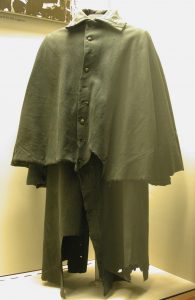By Rob DeHart
Tennessee State Museum

Spoiler alert: This blog post may contain plot spoilers.
In The House Guest, this week’s Mercy Street episode, Alice Green feigns love for a Union soldier in order to gather information for the Rebellion. This scheme turns out to be more dangerous than she thought and results in tragic consequences. Green’s actions mirror Civil War stories of Middle Tennesseans who tried to aid the Confederacy through espionage and smuggling.
 Though women could not join the Confederate Army, there is widespread evidence that they tried to help the cause by smuggling goods across Union lines into the camps of Confederate soldiers. This was enough of a problem that in December 1862, the Nashville Daily Union announced: “To the Ladies – We are informed that the Military Police of this city have adopted a rule to examine all females passing through the lines, who may be suspected of carrying contraband goods, letters, etc. The practice has become so common that they have deemed it absolutely necessary to adopt this course.”
Though women could not join the Confederate Army, there is widespread evidence that they tried to help the cause by smuggling goods across Union lines into the camps of Confederate soldiers. This was enough of a problem that in December 1862, the Nashville Daily Union announced: “To the Ladies – We are informed that the Military Police of this city have adopted a rule to examine all females passing through the lines, who may be suspected of carrying contraband goods, letters, etc. The practice has become so common that they have deemed it absolutely necessary to adopt this course.”
The Annals of the Army of the Cumberland provides an account of an unnamed African-American female servant and her employer caught smuggling for the Confederacy. She was trying to leave Nashville in a cart when it was stopped and searched. The Union guards found nothing suspicious in the cart, but when the woman jumped down to be searched, a “string broke from about her waist, and down tumbled to the ground two pairs of long-legged cavalry boots” which had been hidden in her skirt.
There are also accounts of Confederate spies in Middle Tennessee. One of the most infamous female spies associated with Nashville was Clara Judd. The Annals reported that she traveled from Nashville to Louisville with the purpose of acquiring quinine and other medicines for the Confederacy, but her true intent was to pass Union Army information to Confederate raider John Hunt Morgan. Judd’s information on Union troop strengths and locations along the Louisville and Nashville Railroad helped Morgan lead successful raids. When the Union Army learned of Judd’s involvement, she was arrested and sent to a military prison in Alton, Illinois.

Tennessee’s most famous Civil War espionage story, however, is that of Sam Davis. Born in Rutherford County, Davis served in the 1st Tennessee Infantry, and by 1863 had become a member of “Coleman’s Scouts.” Davis’ job was to work behind enemy lines collecting information on Union troops and delivering that information to Confederate authorities. He was captured in Giles County by Union troops in November 1863 and accused of being a spy when papers with sensitive information were found in one of his boots. It was believed this information could only have come from a Union officer and not just from his observations as a scout. Davis’ life would have been spared had he revealed his source, but he refused, saying “Do you suppose that I would betray a friend? No, sir, I would die a thousand times first.” He was then hanged at the age of 21.
The Union chaplain who attended Davis at the scaffold collected his effects and sent them to Davis’ mother in Smyrna. Eventually many of these items came into the collection of the Tennessee Historical Society and the Tennessee State Museum. Davis’ boot, which is reported to be the one cut open by Union soldiers to reveal the hidden papers, is on display. One account suggests that the shackles worn by Davis while he awaited execution were cutting off his circulation, which may explain why the boot was cut down almost to its sole. Visitors can also see Davis’ overcoat at the museum. More than 150 years old, this coat has been carefully conserved to inhibit deterioration.

Because Davis accepted death rather than reveal his source, some called him the “Boy Hero of the Confederacy.” In the late-19th century, a group of citizens funded the building of a monument to Davis that still sits on the Tennessee State Capitol grounds. Also, his boyhood home in Smyrna is now preserved as the Historic Sam Davis Home and Plantation. Davis’ short life demonstrates the danger faced by soldiers and civilians who engaged in espionage during the Civil War.
Rob DeHart received his M.A. in public history from Middle Tennessee State University, is a peer reviewer for the American Alliance of Museums and is currently developing content for the new Tennessee State Museum opening in 2018.